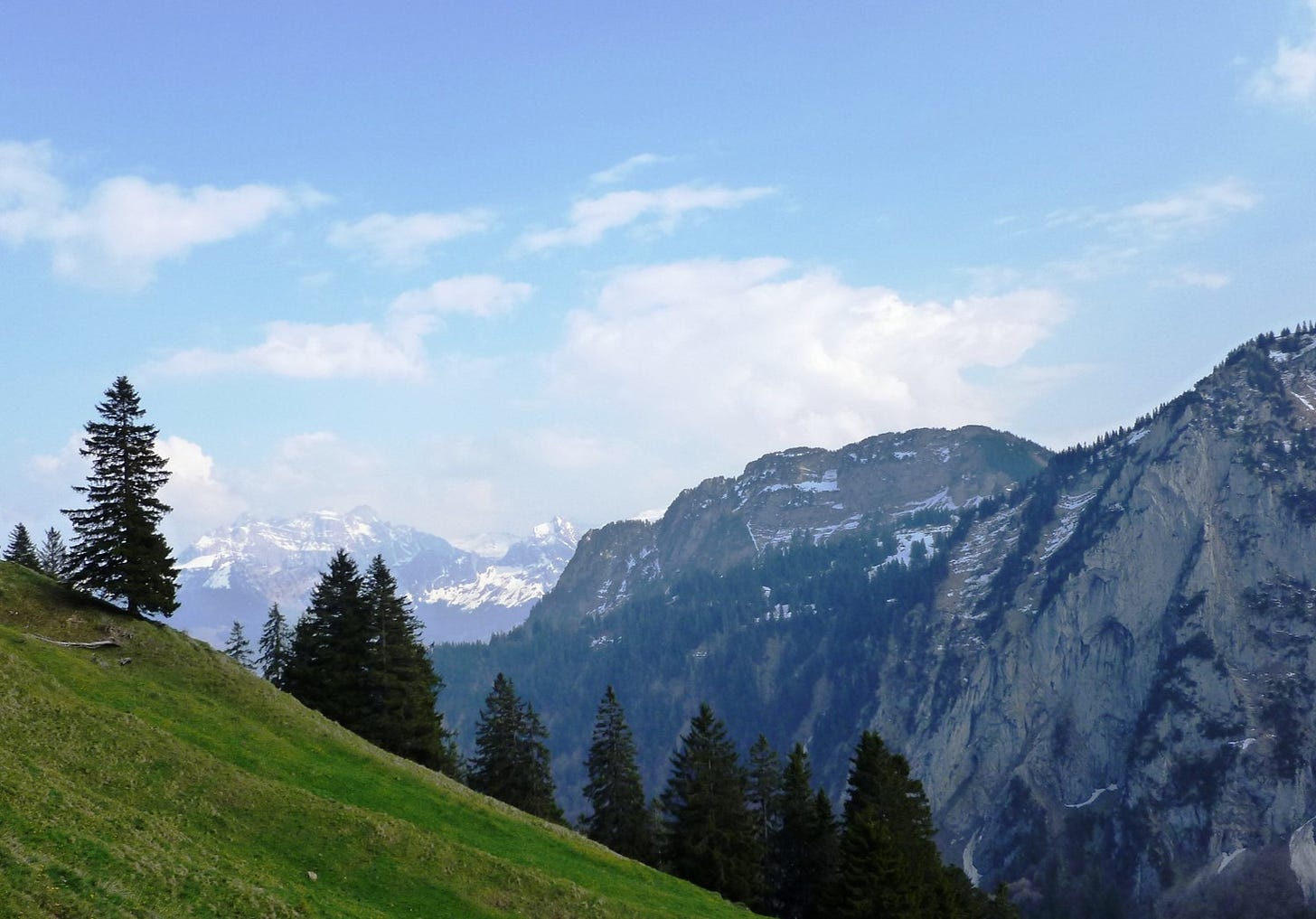Am I doing enough?
The struggles of caring about the environment
Hi readers! On the second Tuesday of each month, I write about a surprise theme in the general field of nature, minimalism, simple living, and sustainability. Today's post will explore what is “enough” effort for the environment and how to, maybe, find balance.
Last week, my environmental organisation ran an event. With a small team of people, we invited speakers, organised a venue, advertised on social media and in our networks, and informed the media. The event went smoothly; hundreds of people joined. A few days later, I spoke to a friend (not from my organisation) who had attended. His only comment was that we should have done more advertising, as the number of participants was too small for the event to “make any difference”. I had been responsible for advertising and had spent many hours on it; so, this remark stung.
This wasn’t the first time I’ve heard this kind of opinion from someone well-meaning. Whether I decide to eat less dairy, plant wildflowers, organise a biodiversity event, or work on a petition with noticeable policy effects – there are always voices saying that it’s somehow “not enough”. They come from friends and colleagues (“This small thing doesn’t make a difference”), from members of my environmental organisation (“We need to achieve more than this”) – and from within my own head. Even though I have implemented a range of sustainable lifestyle changes and spend a significant amount of my time volunteering and advocating, I often feel that I need to do more. I know I’m not the only one.
Why it never feels enough
There are several factors that make it easy to believe we’re not doing or achieving enough. The remarks by others are certainly one of them for me. I know we shouldn’t care what others think. But comments subtly dismissing environmental efforts are frequent enough in my circles (where people do at least vaguely care!) that they don’t feel like isolated opinions. They reflect a common attitude: if an action doesn’t have a noticeable large-scale effect – at national level or so – it’s seen as meaningless.
In addition, people in the environmental movement have been arguing for years that we focus too much on individual and local action, while what we really need is systemic political and economic change (see here for an example). They point out that fossil fuel interests have actively pushed the focus towards individual action to distract from their own role, e.g. by emphasising the personal carbon footprint. But while it does make sense to hold politicians and companies responsible, a focus on systemic change can also make individual or local action feel small and pointless.
And finally, the most obvious reason our efforts can feel too small: Despite everything we do, society currently seems to be moving in the opposite direction to what we’d want. Like many others who care about nature and people, I want humans to live within planetary boundaries, with value systems focusing on respect and care. In many countries, we are increasingly moving further away from that goal.
Add the inner voice from childhood that makes many of us (including me) doubt ourselves, and the common message in society that we must always do more and work harder: It's no surprise we question whether we're doing enough.
Finding peace with our actions
I have been thinking about this lately and have collected some thoughts that help me find peace with what I do and achieve (and what I don’t do and don’t achieve) for the environment. Maybe they are useful for some of you as well.
“Small” actions do matter. It doesn't make sense to think that only actions that generate immediate change at a large scale are meaningful. Of course, political decisions and influential figures can play an important role, but society will never truly change without the small contributions of numerous people and groups. The government could come up with countless programs and incentives for solar energy – if people didn’t install solar panels on their houses, company and community buildings, little would change. And also, why would local effects not matter? More insects in your garden, healthier people in your town thanks to better cycling infrastructure, amphibians carried across the road – all of this improves or saves lives, each of which is valuable.
It's unrealistic to expect to make a huge difference. Driving large-scale transformation is difficult; very few people/groups do (and the world would be quite strange if all of us were able to noticeably affect politics, economy, or dominant opinions at a large scale!). We cannot all be Greta Thunberg. Unrealistic expectations for environmental efforts do nothing but demotivate us and, as a result, aid those who want to keep exploiting the planet.
Imagine our world without “small” actions. Yes, society is moving in the wrong direction, due to strong forces opposing a balanced relationship with nature. But what would the world look like if we all gave up on our small efforts? I’m pretty sure it would be a lot worse.
Small actions can have larger, often invisible effects. As soon as small actions inspire others, there can be ripple effects. So, it’s worth talking about them (here is a great presentation by Katharine Hayhoe about the value of talking about climate change, including the small-scale solutions). The actions and measures we take as organisations, communities, or companies can be shared via newsletters, social media, or local media outlets. And it’s good to remember how easy it is to underestimate ripple effects – not everyone you’ve inspired will tell you about it!
Value shifts needs local action. For society to become truly sustainable, values need to change away from the “disconnection from and domination over nature and people” (IPBES Transformative Change Assessment). And for values to shift, people need to get out into nature more, see with their own eyes what a sustainable way of living could look like, and connect with people who care. These things happen locally, via personal interaction, often slowly. I don’t see how large-scale political and economic changes alone could ever transform how we feel about the world and our place in it. So, whether you teach children about the forest, help out in a community garden, organise a clothes swap, or just tell friends about some changes you’ve made in your own life – you are making a contribution.
Given that small actions do matter, in the end, I believe that whether we’re doing “enough” is not determined by whether me achieve a measurable effect – but by whether we make a genuine effort. In Western society, we do have a collective moral responsibility to take action on the environment. The historical developments leading to the status quo are not our fault, but it's our task to contribute to a better future. At the same time, at the individual level, our resources – time, money, and physical and mental energy – are limited. Some of us need to care for their children, have mental or physical health issues, or already invest a lot in other important causes – and all of us need free time and rest! So, how can we know we’re doing enough? Maybe we can just ask ourselves: Am I implementing the environmental habits that improve my life at the same time, the win-win solutions1? Am I working on those that might feel like a bit more of an effort but don’t really reduce my quality of life2? Wholeheartedly doing this, from my perspective, is enough – whatever the result looks like.
Do you also sometimes feel like you should be doing more? Or are you at peace with the way you're contributing? I'd love to read your thoughts in the comments!
Hannah
Examples for my life: Giving up driving (I hate driving…), sharing biodiversity info I am excited about, buying most clothes second-hand
Examples for my life: Volunteering in an environmental group, minimising flying




I wholeheartedly agree with this. I think the rhetoric that small actions don’t make a difference is damaging. It leads to people not trying because what’s the point, if small actions don’t matter. One of us on our own taking small actions might not make much difference. But there are a LOT of us. And our small actions add up. Also one action might not make a lot of difference, but when you take small actions regularly, consistently even, small lifestyle changes add up to a big difference.
If we were to stack all the little things that people do to protect nature, all over the world, I bet we could wrap the world in a blanket of care. We just need to share what we are doing and feel less isolated. It feels so massive when the news is so negative. Wouldn’t it be lovely to out shout the self interested shouters with positive nature news rather than all the damaging self interest. Thank you for the encouraging article.